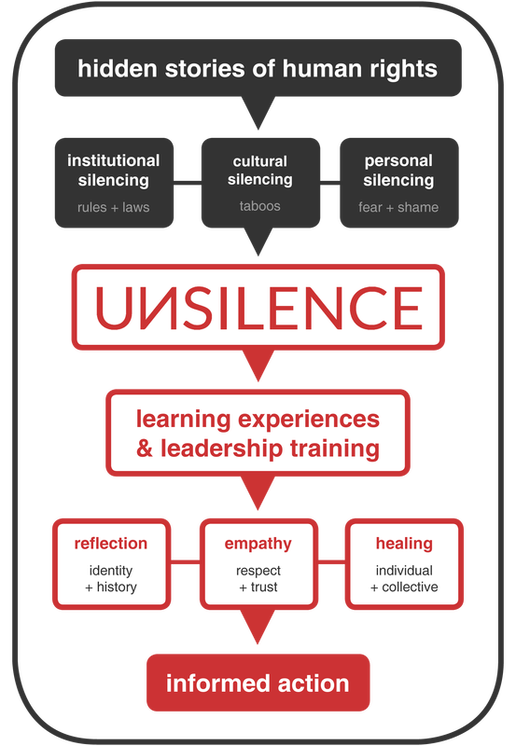framework
|
If we can't talk about injustice, we can't find solutions.
Why is it so hard to talk about what matters most? hidden stories of human rightsShame, trauma, fear of public ridicule, social norms, and even school and government policies keep people silent and stories hidden. It can be so hard to talk about – and listen to – experiences of trauma, persecution, racism, and discrimination. Unsilence helps educators, young people, and communities challenge stigmas and start difficult conversations.
institutional silencingGovernments and institutions of all kinds have the power to create laws, regulations, policies, systems, and unspoken rules that can keep important stories and issues hidden. The people within these institutions - especially those in leadership roles, but also people at all other levels - have the power to unsilence.
cultural silencingInformal social norms and unspoken customs - driven by collective embarrassment, awkwardness, etiquette, perceptions of modesty, and peer pressure - can turn into harmful taboos that push urgent issues into the shadows. A lack of social supports to talk openly can also keep stories hidden. Together, communities and families have the power to unsilence.
personal silencingTrauma and shame can prevent individuals from sharing important stories. Fear of judgement from other people and fear of other negative consequences can stop us from speaking openly. Every person's unique circumstances can keep stories of suffering in the shadows, but with the right supports and with people willing to listen, we each have the power to unsilence.
Unsilence breaks taboos and lifts voices to illuminate stories of human rights and ignite action against injustice. Unsilence creates empowering learning experiences for youth and the public, and teach educators and community leaders, to spark dialogue, support critical thinking, and build empathy to inspire healing and social change.
learning experiencesUnsilence uses pedagogically-sound, research-driven approaches to draw people into human rights content. Unsilence in-person learning experiences include youth workshops and community programs. Unsilence free online content is highly-interactive and story-driven and includes human rights fiction, WebQuests, choose-your-own-pathway stories, virtual exhibitions, and other engaging methodologies.
leadership trainingUnsilence creates and delivers leadership training to young people, teachers, informal educators, health professionals, and social workers. Unsilence prepares and supports them to facilitate difficult conversations and implement Unsilence learning experiences with their communities. Unsilence also delivers institutional training with the goal of engaging professional teams in conversations about human rights, social justice, and ethical practices.
reflectionMeaningful reflection is at the heart of every Unsilence experience. Unsilence programs ask young people and adults to think deeply about their own identities, and about our shared histories, including hidden histories. This sets the stage for communities to confront specific problems in society and answer urgent questions about our world. Communities come to reflect on what human rights means today, to reflect on how we perceive and interact with others, and to reflect on our own experiences, emotions, and actions.
empathyAffecting meaningful social change starts with how we perceive and connect with other people. Through innovative storytelling, Unsilence helps young people and adults make connections with people they might usually perceive as "the Other." Unsilence programs ignite conversations that, in other contexts, may be impossible to have. By inspiring deep empathy, Unsilence sparks constructive dialogue across social divides, leading to mutual respect and deep trust, which are essential for lasting social change.
healingTo ignore something is to pretend it doesn't exist. When others take time to listen and show they care, they are saying, I see you, I hear you, I believe you. Unsilencing - to name and speak openly about different forms of silencing and then to break through the barriers that keep stories hidden - can help individuals, families, communities, and societies heal.
informed actionBreaking taboos and having difficult conversations are the first steps toward meaningful social change. Unsilence learning experiences and leadership trainings prepare and support young people and adults to take deliberate, mindful action in their communities. Young people create grassroots programs - based on research and best practices - to address a broad range of social issues. Educators adapt how and what they teach. And institutions change their practices. Together, we unsilence.
Unsilence, Copyright 2024. All Rights Reserved. |


